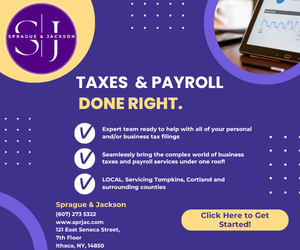ITHACA, NY (607NewsNow) — As April 15th approaches, you may find yourself in a situation where you need more time to file your taxes. Don’t panic—requesting an extension is a great way to buy some extra time to gather your paperwork. But it’s important to understand what an extension does—and doesn’t—cover.
Understanding Extensions
An extension gives you six more months to file your tax return, moving the deadline to October 15th. However, it’s crucial to note that this extension only applies to the filing of your return—not the payment. If you owe taxes, you’re still required to pay the amount due by April 15th. Failing to do so will result in interest and penalties, which can add up quickly.
To avoid this, try to estimate your tax liability and pay as much as possible by April 15th. This way, you can minimize the interest you’ll owe when you finally file your return.
What to Work on During the Extension Period
Once you’ve filed for an extension, use the extra time wisely. Focus on reviewing your deductions and credits to ensure you’re maximizing your tax benefits. If you haven’t already, consider contributing to your retirement accounts like IRAs or HSAs. These contributions can often be made up until April 15th and still count toward the prior tax year.
Business owners should also review their documentation carefully, especially if they’re considering large investments that can provide tax benefits. Taking time now to properly document expenses and deductions can prevent headaches when you’re ready to file.
Avoid Common Tax Mistakes
Even with an extension, it’s important to be cautious about some common tax mistakes. For instance, double-check all your personal information, including your Social Security number and that of your dependents, as simple errors can lead to delays in processing your return.
If you’ve made charitable contributions, be sure to have proper documentation to support those claims. Without the right paperwork, the IRS could disallow those deductions, which might cost you.
Additionally, review your filing status, and ensure that all your forms—such as W-2s, 1099s, and any other income documents—are accurate and submitted properly.
Tax Tips for Businesses
For business owners, April is also a crucial month. Even if you file an extension, remember that certain obligations, such as quarterly estimated tax payments or sales tax filings, may still be due in April. Failing to keep up with these can lead to further penalties and interest.
It’s also a good time to plan for future tax years. Take a look at your expenses and consider making strategic purchases before the year ends. Investing in new equipment or technology could reduce your taxable income and set you up for success down the road.
Reach Out for Personalized Support
If tax season feels overwhelming, remember that help is just a call away. At Sprague & Jackson, we specialize in helping both individuals and businesses navigate the complexities of tax season, from extensions to final filings. We can even review previous returns up to three years prior to see if any amendments are needed.
For a more personalized tax consultation, reach out today to Sprague & Jackson. You can give us a call or visit www.sprjac.com for more information!




